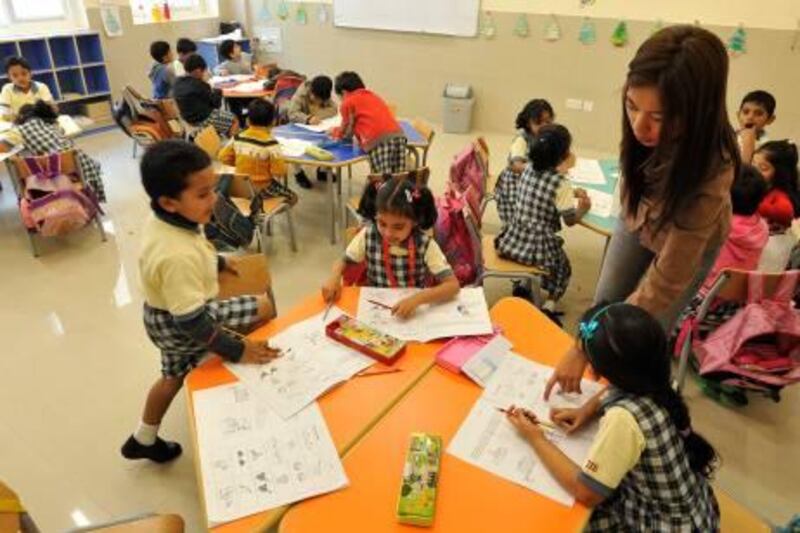DUBAI // Education officials say they will block the expansion of below-standard private schools in the emirate, despite a growing demand for places.
Close to the start of the 2011/2012 academic year there were more than 8,500 parents still in need of places in Dubai's private schools, according to the Knowledge and Human Development Authority (KHDA). But the authority's director general said this week he would not be handing out operating licenses in large numbers to ease the problem.
"We are not looking at the quantity of schools that come up but how many quality seats are available in the emirate," said Dr Abdullah Al Karam, the director-general of the KHDA, who attended the inauguration of an Indian school on Monday.
"We will ask private education providers, do you have an existing school? How well do you run that school?"
He said schools that have not shown significant improvement have had their operations curtailed. "There are restrictions on these schools. We have not allowed them to expand."
Indian parents face increasing pressure to find spaces for their children. Hundreds face lottery-style draws for places later this month.
One parent, Valsrajan Valiyapurakkal, said he would have to send his family back home if he could not secure a seat for his daughter at an Indian school this year.
"It is looking impossible at the moment," he said. "My daughter is on a waiting list and it is worrying me."
He said there were 40 pupils competing for 16 vacancies in Grade 7 at the school he has applied to.
"My daughter has passed the entrance test but that really does not matter."
He said he could afford only a handful of schools in the emirate. "I will have to send them back if I cannot find a school in my budget that offers good education."
Despite the uncertainty, Mr Valiyapurakkal said he agreed with the KHDA's stance and would rather send his family back to India than sacrifice the quality of his daughter's education.
Four new schools are scheduled to open during this academic year, but only one of those is Indian.
Indian Academy, opening in April, will be joined by three other international schools - Dubai Women's High School, Formark Hall Prep and Uptown Mirdif will open in September.
Mohan Valrani, the chairman of the Indian International School, which was formally opened on Monday by Sheikh Ahmed bin Saeed Al Maktoum, the president of the Dubai Civil Aviation Authority, said four further schools were planned.
"Our aim is to provide access to good quality education, which we believe is a fundamental right," said Mr Valrani.
"We are already in talks with the authority and plan to build one every two years."
The Indian High School, which is the parent campus of the Indian International School, currently educates 10,000 pupils from Grades 1 to 12. Its new campus can accommodate 3,000 at full capacity.
The parent campus received an Outstanding rating in a recent cycle of inspections by the Dubai Schools Inspection Bureau, which gives them a clear path to expand.
Dr Al Karam said schools that had shown consistent progress in inspections would be supported and encouraged to expand.
"We will go all the way to assist school operators that have raised the quality of education. We will work with the landlords and in other areas to ensure they can build the school," he said.
Taaleem, which opened its first school here in 2005, will manage the new 2,000 capacity Uptown School in Mirdif this September.
Clive Pierrepont, the director of communications at Taaleem, warned that without supervision, the growing education sector risked attracting operators with little local knowledge and the wrong motives.
"It is right that the regulators carefully scrutinise the credentials and motives of operators looking to enter the market for many are making speculative forays," he said.
He added, however, that there was still room for newcomers. "There are providers who would enrich the educational provision, and provide further choice and healthy competition."






